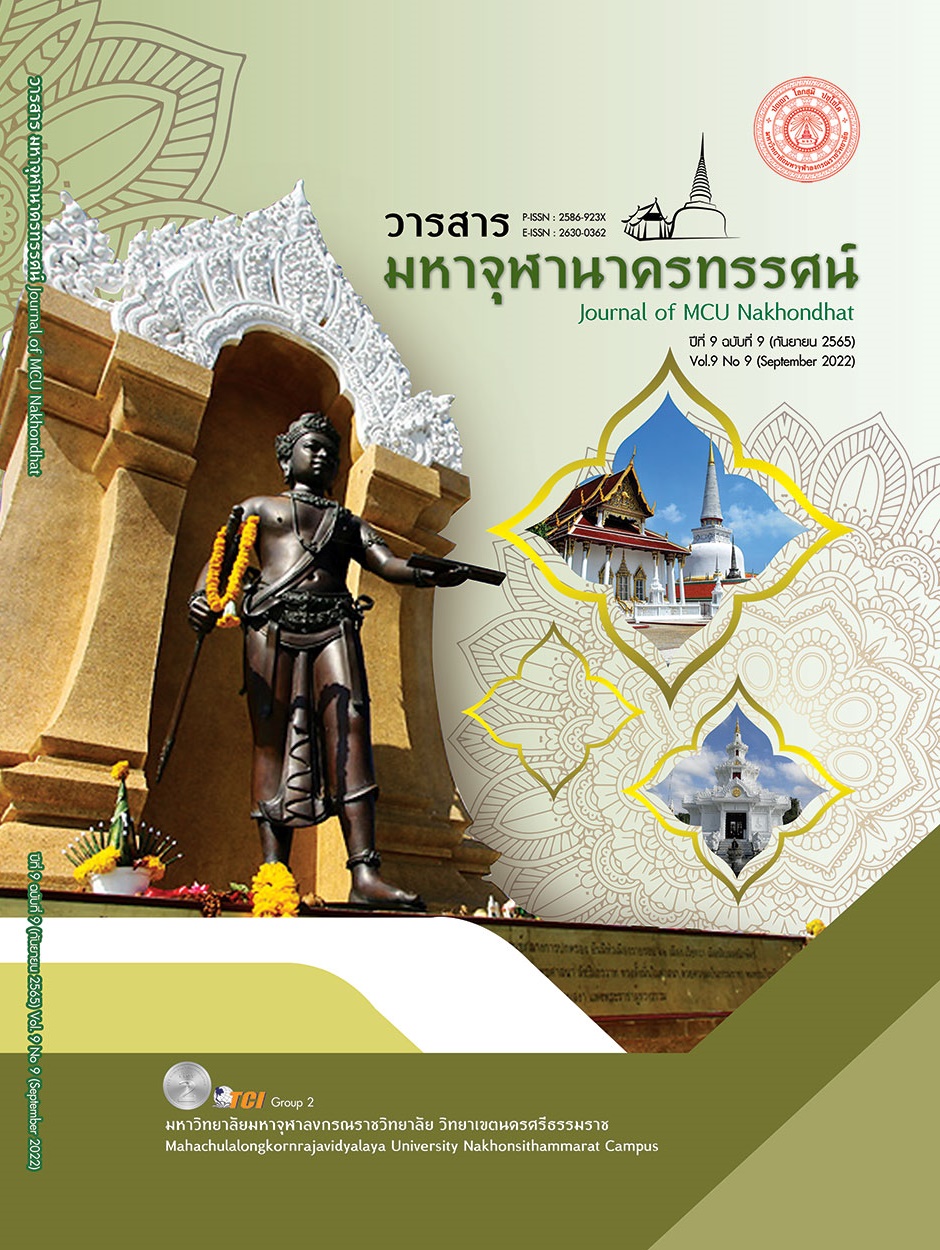DEVELOPMENT OF COMPETENCE IN THE ADMINISTRATION OF SANGHA AFFAIRS ACCORDING TO THE BUDDHIST PRINTCIPLES OF THE ABBOT
Main Article Content
Abstract
Guidelines for the development of competence in the management of Sangha affairs according to the Buddhist principles of the abbot It focuses on developing competencies or potential for managing an organization to its fullest potential by using strategies, Buddhist principles, and skills to effectively develop existing competencies in three areas as follows: training, education, and development that can enable the organization to achieve its goals and the use of mercy in the administration and development of temples, The Buddhist moral code used is the Four sublime states of mind 1) loving-kindness: love, goodwill towards monks, novices, people, and Buddhism 2) compassion: benevolent, helping others to get out of suffering, 3) sympathetic joy: having a gentle mind, willing to help and support monks, novices and people in moderation. 4) equanimity: fair, upright, able to trust neutral. To have a role in the community or help to promote the community in all aspects, as well as promoting, supporting and using organizational management skills. Allowing the community to take part in the care of religious sites and management of the clergy. The Buddhist moral code used is the Four Foundations for Accomplishment consist of 1) Passion, satisfaction, and willingness to perform the duties of the abbot 2) Diligence, there is continuous effort, daring to face all obstacles. 3) Mind or Consciousness, have a determined mind to concentrate on performing duties. 4) Investigation, wise and contemplative, reviewing the performance of one's duties correctly It has good efficiency according to the teachings of Buddhism in a systematic way according to the principles of the Dharma and Discipline. for the maximum benefit of human development society and the nation in the future.
Article Details

This work is licensed under a Creative Commons Attribution-NonCommercial-NoDerivatives 4.0 International License.
References
กิติ ตยัคคานนท์. (2543). เทคนิคการสร้างภาวะผู้นำ. (พิมพ์ครั้งที่ 10). กรุงเทพมหานคร: สำนักพิมพ์เปลวอักษร.
ชัญญาณัฏฐ์ จิณณณัฐชา. (2554). การพัฒนาบุคลากรโดยใช้แนวทางสมรรถนะ. . ใน วิทยานิพนธ์วิทยาศาสตรมหาบัณฑิต สาขาวิชาเทคโนโลยีสารสนเทศบัณฑิตวิทยาลัย. มหาวิทยาลัยเทคโนโลยีมหานคร.
ชำเลือง วุฒิจันทร์. (2525). การพัฒนากิจการคณะสงฆ์และการพระศาสนาเพื่อความมั่นคงของชาติ. กรุงเทพมหานคร: วิทยาลัยป้องกันราชอาณาจักร.
พระเทพปริยัติสุธี วรวิทย์ คงฺคปญฺโญ. (2545). การคณะสงฆ์และการศาสนา. กรุงเทพมหานคร: โรงพิมพ์ มหาจุฬาลงกรณราชวิทยาลัย.
พระธรรมปิฎก ป.อ. ปยุตฺโต. (2546). ภาวะผู้นำความสำคัญต่อการพัฒนาคน พัฒนาประเทศ. กรุงเทพมหานคร: สำนักพิมพ์ธรรมสภา.
พระปริยัติสุธี (วรวิทย์ คงฺคปญฺโญ). (2540). วิทยาพระสังฆาธิการ เล่ม 2 (พิมพ์ครั้งที่ 4). กรุงเทพมหานคร: บริษัท สหธรรมิก จำกัด.
พระพรหมคุณาภรณ์ (ป.อ. ปยุตฺโต). (2536). พุทธศาสนากับการพัฒนามนุษย์. กรุงเทพมหานคร: บริษัทสหธรรมิก จำกัด.
พระมหาพระรจน์ อภิปุญฺโญ. (2562). การศึกษาวิเคราะห์ภาวะผู้นำเชิงพุทธของเจ้าอาวาส: กรณีศึกษาเจ้าอาวาส ในอำเภอลำทะเมนชัย จังหวัดนครราชสีมา. ใน วิทยานิพนธ์พุทธศาสตรมหาบัณฑิต. สาขาวิชาพระพุทธศาสนา. บัณฑิตวิทยาลัย. มหาวิทยาลัยมหาจุฬาลงกรณราชวิทยาลัย.
พระมหาสมทรง สิรินฺธโร และคณะ. (2525). บทบาทของวัดและพระสงฆ์ไทยในอนาคต. กรุงเทพมหานคร: บริษัท เกล็ดไทยจำกัด.
พระอธิการสุพิศ อํสุสีโล และพระมหาดาวสยาม วชิรปุญฺโญ. (2563). การพัฒนาศักยภาพของพระสังฆาธิการในสังคมไทย. วารสารพุทธมัคค์, 5(2), 130-139.
พิสิฐ เจริญสุข. (2554). คู่มือการปฏิบัติงานของหน่วยอบรมประชาชนประจำตำบล. กรุงเทพมหานคร: โรงพิมพ์กรมการศาสนา.
มหาวิทยาลัยรามคำแหง. (2552). แผนพัฒนาบุคลากรของมหาวิทยาลัยรามคำแหง ประจำปีงบประมาณ พ.ศ.2552–2555. กรุงเทพมหานคร: มหาวิทยาลัยรามคำแหง.
ราชบัณฑิตยสถาน. (2552). พจนานุกรมศัพท์ศาสนาสากล อังกฤษ-ไทย ฉบับราชบัณฑิตยสถาน (พิมพ์ครั้งที่ 3). กรุงเทพมหานคร: ราชบัณฑิตยสถาน.
สำนักงานคณะกรรมการการศึกษาแห่งชาติ. (2544). คู่มือการประเมินผลภายในของสถานศึกษาตามมาตรฐานการศึกษา การออกแบบระบบประเมินผลภายใน. กรุงเทพมหานคร: สำนักงานคณะกรรมการการศึกษาแห่งชาติ.
สำนักงานเลขาธิการมหาเถรสมาคม กรมการศาสนา กระทรวงศึกษาธิการ. (2560). คู่มือพระสังฆาธิการและพระวินยาธิการ. กรุงเทพมหานคร: โรงพิมพ์การศาสนา.
สุภาคย์ อินทองคง. (2550). การใช้หลักพุทธธรรมนำการวิจัยและพัฒนาตามปรัชญาเศรษฐกิจพอเพียงสู่สุขภาพองค์รวม. เรียกใช้เมื่อ 18 กุมภาพันธ์ 2565 จาก http://www.thaingo.org
สุรชาติ ณ หนองคาย. (2546). การวางแผน การบริหารจัดการเชิงกลยุทธ์และหลักการประเมินผล. กรุงเทพมหานคร: สถาบันจีอีซี.
Matthews, A., and Whelan, J. (1993). In Charge of the Ward. (3rd Ed.). Australia: Blackwell Scientific Publications.
Spencer and Spencer. (1993). Competency at Work: Model for Superior Performance. New York: Wily & Sons.


